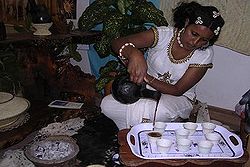- Coffee ceremony
-
 An Eritrean woman pouring traditionally brewed coffee into finjal from a jebena.
An Eritrean woman pouring traditionally brewed coffee into finjal from a jebena.
A coffee ceremony is a ritualised form of making and drinking coffee. The coffee ceremony is one of the most recognizable parts of Arab, Eritrean and Ethiopian culture. Coffee is offered when visiting friends, during festivities, or as a daily staple of life. If coffee is politely declined then most likely tea (shai) will be served.
Contents
Brewing
The coffee is brewed by first roasting the green coffee beans over hot coals in a brazier. Once the beans are roasted each participant is given an opportunity to sample the aromatic smoke by wafting it towards them. This is followed by the grinding of the beans, traditionally in a wooden mortar and pestle. The coffee grounds are then put into a special vessel and boiled. The boiling pot (jebena) is usually made of pottery and has a spherical base, a neck and pouring spout and a handle where the neck connects with the base. When the coffee boils up through the neck it is poured in and out of another container to cool it, and then is put back into the boiling pot until it happens again. To pour the coffee from the boiling pot, a filter made from horsehair or other material is placed in the spout of the boiling pot to prevent the grounds from escaping.
Serving
The host pours the coffee for all participants by moving the tilted boiling pot over a tray with small, handleless cups without stop until each cup is full. Some of the coffee will inevitably miss the cup but this is done to prevent the coffee grounds from contaminating the brew. One extra cup is poured each time. The grounds are brewed three times: the first round of coffee is called awel in Tigrinya, the second kale'i and the third bereka ('to be blessed'). The coffee ceremony may also include burning of various traditional incense such as frankincense or gum arabic.
See also
External links
- Coffee and Tea Ceremony slideshow at Sidamo Coffee and Tea
- EthioCoffee (ECO)
- Ethiopian Coffee Ceremony at Epicurean
Categories:- Eritrean culture
- Ethiopian culture
- Coffee culture
Wikimedia Foundation. 2010.
